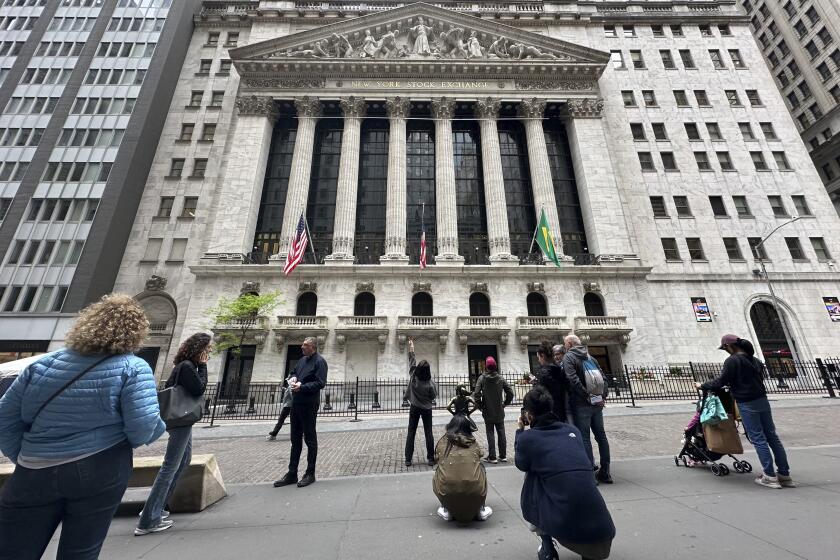‘SuperMontage’ Nasdaq Trading System OKd By SEC
The Securities and Exchange Commission approved a controversial plan Wednesday to revamp Nasdaq’s much-maligned stock trading system, potentially making trading cheaper and easier but also drawing a protest from critics who said the overhaul will hurt small investors.
The SEC voted unanimously to approve “SuperMontage,” an updated version of Nasdaq’s 30-year-old computer-based trading platform. The new system will display on traders’ screens more quotations for each stock than does the current system.
Nasdaq has portrayed SuperMontage as a major advance that will streamline and demystify the complex process by which investors buy and sell shares of companies such as Microsoft and Intel. SuperMontage also will fully automate the execution of orders to ensure that they’re handled faster and more reliably, Nasdaq said.
“It is a very significant change in the architecture of the marketplace, which effectively provides a more perfect market from an information standpoint,” said Frank Zarb, Nasdaq chief executive.
Though critics acknowledge some benefits, they said SuperMontage is a step backward for small investors. They argue that it reinforces long-standing trading practices that harm individuals and creates a scenario in which small investors could find themselves at the mercy of major brokerages when it comes to having certain types of orders filled.
The fair treatment of small investors has been at the heart of reforms enacted since Nasdaq’s 1996 settlement of price-fixing charges. Yet on Monday, the SEC issued a study saying investors still are likely to get worse prices when they trade Nasdaq stocks than New York Stock Exchange issues.
Under SuperMontage, which is likely to be phased in later this year, brokerage traders in Nasdaq stocks will see the three best buy and sell orders offered for each issue at any moment from each brokerage. The system also will calculate the total number of shares available at the three best prices.
The current Nasdaq system shows just the single best “bid” and “asked” price from each brokerage.
In theory, greater visibility of buy and sell orders would allow traders to strike the best possible deals for investors.
But SuperMontage has been engulfed in controversy almost from the moment Nasdaq proposed it in October 1999. Since then, Nasdaq amended its proposal at least eight times to address various complaints from lawmakers, consumer groups and rival trading systems.
Criticism of SuperMontage centers on the idea that it could prevent individual investors from securing the more favorable prices that the system may give to pros--meaning prices better than the market quote at a given moment.
Nasdaq’s current format has long prevented individuals from getting such “price improvement,” which in total may cost them millions of dollars a year, critics said.
The amended SuperMontage plan, these critics said, includes a little-noticed provision that deals a potentially severe blow to individuals trading with “limit” orders--the primary way small investors try to garner better prices. With a limit order, an investor says he or she will buy or sell only at a specific price or better.
In a nutshell, SuperMontage will in some instances allow Wall Street firms to fill stock orders from big investors ahead of those of individuals, even if the small-investor orders were placed first.
To illustrate, say there are 20 tickets left for a nearly sold-out movie, but there are people in line seeking a total of 100 tickets, said Harold Bradley, senior vice president at American Century mutual funds. The theater owner would be able to bypass an individual at the front of the line seeking only one ticket in favor of selling to someone farther back who will buy all 20 tickets at once at the same price.
“It’s an absolute abomination and an attack on the little guy,” Bradley said.
Levitt acknowledged that SuperMontage “does not meet every challenge faced by the Nasdaq market.” In fact, he said it accomplishes “relatively little” in one key area: giving small investors the chance to secure better prices by meeting directly on Nasdaq rather than via a brokerage intermediary.
But he said SuperMontage was a step forward because it supplies investors with more detailed price information with which to trade and because it speeds the process by which orders are executed.
Critics also said SuperMontage will cement the practices of “payment for order flow” and “internalization.” Both practices, they said, prevent individuals from getting the best prices available in the market because they allow online brokerages to send orders to Wall Street firms that pay them kickbacks but don’t necessarily give investors the best deals.
Barbara Roper, director of investor protection for the Consumer Federation of America, pointed out that Levitt has repeatedly complained about payment for order flow and brokerage internalization as being unfair to individuals.
“Having raised those issues, it just doesn’t make sense for them to turn around and approve a SuperMontage proposal that not only perpetuates those practices but in some ways encourages them,” Roper said.
Some analysts also believe that SuperMontage could undermine competition that has spurred a host of pro-investor innovations. Specifically, opponents contend that some independent trading systems known as electronic communications networks, or ECNs, would be put at a competitive disadvantage.
ECNs have emerged in the last few years as the most potent rivals to the brokerages operating on Nasdaq and are credited with helping narrow the difference between Nasdaq stocks’ bid and asked prices.
ECNs profit by charging “access fees” of up to 1.5 cents a share for trades. Brokerages, which profit from a stock’s bid-asked spread, don’t charge access fees. Under SuperMontage, ECN fees could be added to their stock quotes depending on how users program their screens.
That potentially gives brokerages a big advantage, because their quote to buy shares of a stock at, say, $20 would always be displayed at the top of a trading screen. Below them would be the $20.01 quote of an ECN. Yet Critics say that because ECN fees are rarely passed directly to investors, it is wrong to portray ECN quotes as inferior.
ECNs had initially vehemently objected to SuperMontage. But after Nasdaq made changes, one ECN, Bloomberg Tradebook, supported SuperMontage, while some others said they had become neutral.
Some analysts say the terms of the SEC’s approval of SuperMontage give ECNs a better chance of survival as competing entities.






